#Jewish Parable
Explore tagged Tumblr posts
Text




#whiteboard arts :)#ft:#sam should be allowed to say fuck#attempted designs for arthur lester (although they don't look quite right)#jewish stanley because i'm partially jewish and i say so#martin but a greek statue <3#n e ways#tma#tma fanart#the magnus archives#lotr#lotr fanart#samwise gamgee#malevolent#malevolent fanart#arthur lester#tspud#tspud art#the stanley parable#tspud stanley#tspud narrator#whiteboard#mossiistars
84 notes
·
View notes
Text

had a strong urge to draw Stanley in this exact pose
#tsp stanley#the stanley parable#my art#tsp lovebug au#fun fact I headcanon him as ethnically jewish
11 notes
·
View notes
Text
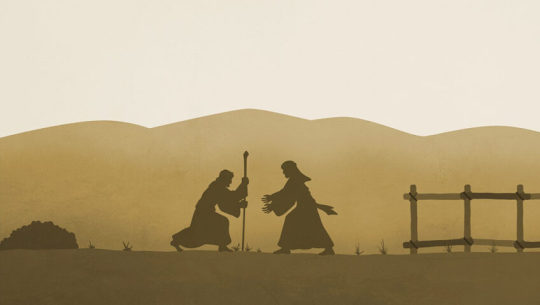
The Parable of the Prodigal Son
OJB
11 And Rebbe, Melech HaMoshiach said, A certain ben Adam had shnei banim (two sons). 12 And the younger of them said to his Abba, Avi, give to me the share of the estate that falls to me. And his Abba divided his wealth between them. 13 And not many yamim later, having gathered together everything, the younger ben went on a journey to a far away country, and there he squandered his osher (riches) with gilui arayot (sexual immorality) and loose living. [YESHAYAH 59:2] 14 And when he had spent everything, there came a severe ra'av (famine) throughout that aretz, and he began to be nitzrach (needy). 15 And he went and became associated with one of the citizens of that aretz, and he sent him into his fields to feed chazirim, [VAYIKRA 11:7] 16 And he was longing to fill his mogen (stomach) with the pods which the chazirim were eating, and no one was giving anything to him. 17 When he came to his senses, his seichel told him, How many of my Abba's sachirim (hired workers) have more than enough okhel (food) and I am perishing here with hunger. 18 I will get up and go to my Abba, and I will say, Avi, I sinned against Shomayim and in your sight. [VAYIKRA 26:40; TEHILLIM 51:6(4)] 19 I no longer have the zokheh (merit) worthy to be called a ben of my Abba. Make me as one of your sachirim (hired workers). 20 And when he got up he came home to his own Abba. And while he was still a long way off, his Abba saw him, and was filled with rachmei Shomayim (heavenly mercy, compassion) and tears, and fell upon his neck and kissed him. [Gn 45:14] 21 And bno said to the Abba, Avi, I sinned against Shomayim and in your sight. No longer do I have the zokheh (merit) to be worthy to be called your ben. [Psa 51:6(4) 22 But his Abba said to his avadim, Shnel! (Quick!) Bring out the best kaftan and clothe him, and put a ring on his hand and sandals for his feet, [ZECHARYAH 3:4; BERESHIS 41:42] 23 And bring the fattened calf, and slaughter it, and let us eat and have a simcha, 24 Because this ben of mine was dead and now he has returned l'Chayyim! He had been lost and now he is found. And they began to make a simcha.
KJV
11 And he said, A certain man had two sons:
12 And the younger of them said to his father, Father, give me the portion of goods that falleth to me. And he divided unto them his living.
13 And not many days after the younger son gathered all together, and took his journey into a far country, and there wasted his substance with riotous living.
14 And when he had spent all, there arose a mighty famine in that land; and he began to be in want.
15 And he went and joined himself to a citizen of that country; and he sent him into his fields to feed swine.
16 And he would fain have filled his belly with the husks that the swine did eat: and no man gave unto him.
17 And when he came to himself, he said, How many hired servants of my father's have bread enough and to spare, and I perish with hunger!
18 I will arise and go to my father, and will say unto him, Father, I have sinned against heaven, and before thee,
19 And am no more worthy to be called thy son: make me as one of thy hired servants.
20 And he arose, and came to his father. But when he was yet a great way off, his father saw him, and had compassion, and ran, and fell on his neck, and kissed him.
21 And the son said unto him, Father, I have sinned against heaven, and in thy sight, and am no more worthy to be called thy son.
22 But the father said to his servants, Bring forth the best robe, and put it on him; and put a ring on his hand, and shoes on his feet:
23 And bring hither the fatted calf, and kill it; and let us eat, and be merry:
24 For this my son was dead, and is alive again; he was lost, and is found. And they began to be merry. — Luke 15:11-24 | Orthodox Jewish Bible (OJB) and King James Version (KJV) The Orthodox Jewish Bible fourth edition, OJB. Copyright 2002,2003,2008,2010, 2011 by Artists for Israel International. All rights reserved and the King James Version Bible is in the public domain. Cross References: Genesis 41:42; Genesis 45:14; Genesis 46:29; Deuteronomy 21:17; 1 Samuel 28:24; 2 Samuel 14:33; Job 33:27; Psalm 51:4; Psalm 119:59; Proverbs 13:25; Proverbs 15:17; Hosea 2:7; Zechariah 3:4; Matthew 7:6; Matthew 8:22; Mark 12:44; Luke 9:60; Luke 15:10; Luke 15:25; Luke 15:32; John 5:25; Acts 20:37; Romans 11:15
Read full chapter
What is the meaning of the Parable of the Prodigal Son?
#Jesus#parables#the prodigal son#Luke 15:11-24#Gospel of Luke#New Testament#OJB#Orthodox Jewish Bible#Artists for Israel International#KJV#King James Version Bible
5 notes
·
View notes
Text
In other news, I borrowed my friend’s tanakh, and I’m reading it. This might sound weird, but I never realized how funny the Torah is.
Abraham bargaining HaShem down from saving Sodom and Gomorrah if there’s 50 innocent people to 10? The wife-sister thing happening not once, not twice, but THREE TIMES? Isaac naming a well “harassment” because people won’t stop trying to claim his wells? Those are all really good bits.
#And they still have interesting moral parables and questions in them#I love that Jewish humour is the same millennia later#dramatic monologues
2 notes
·
View notes
Text
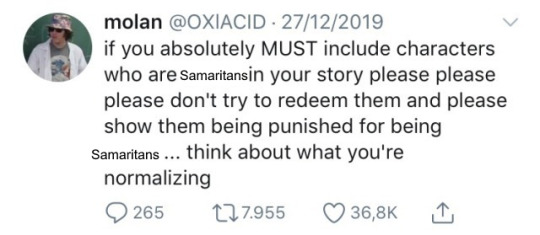
#bible fandom#i am awful#incorrect quotes#bad photoshop#context is someone offended that the parable of the good samaritan had a samaritan instead of a generic jewish dude
2 notes
·
View notes
Text
One Vine, Many Branches: Honoring the Shared Wisdom of Judaism and Christianity.
Rediscovering the Sacred Bond of Love and Compassion Introduction This essay began as a personal contemplation of the mezuzah, a small but profound symbol in Jewish tradition, traditionally placed on the doorposts of a home. As I considered placing a mezuzah in my own home and reflected on the scripture within it, I realized its message is universal—one that resonates deeply with both Jews and…
#bible#biblical compassion#Christian-Jewish connection#christianity#covenant of love#faith#faith and service#Inner peace#interfaith unity#Jesus#Jesus Jewish roots#Judaism#love your neighbor#meditation#mezuzah meaning#Mindfulness#mutual respect#New Testament teachings#non-duality#Old Testament commandments#Parable of the Good Samaritan#Rabbi Hillel#religion#religious harmony#Self-Realization#shared faith#Spiritual Awakening#spiritual growth#spiritual journey#Spiritual Practice
0 notes
Text
Who Is in Control of Whom?
A man was charged with committing a serious crime against the king and placed in prison until his trial. When it came time for him to stand trial, one of the king’s guards took him from his cell and escorted him to the place of justice. The king’s guard, suspecting that the prisoner might try to escape, took a pair of handcuffs from his pocket. He then placed one of the cuffs around the wrist of…
0 notes
Text
for my history exam instead of taking the test should i just write about everything he got wrong about the bible in the last three weeks of class
#*ignores the question* in the parable of the good samaritan a key point is that the two people who passed the injured man on the road were#people in positions of power in jewish society at the time: a levite priest and a rabbi iirc. both these supposedly respectable men turned#their heads to ignore the suffering of thew jewish man on the road. when a samaritan-a member of a culture group that often conflicted with#the jewish people-walked by he saw the jewish person suffering and helped him up brought him to an inn and paid for his lodging and medical#treatment. he was not rewarded in any tangible way-unlike when YOU said in lecture that he got rich because of it. therefore the lesson is#NOT ‘do good things and you will be rewarded’ but rather-get this-an answer to a question posed to jesus. this question was ‘who is my#neighbor?’ pertaining to jesus’ great commandment love your neighbor as yourself. jesus told the parable of the good samaritan in order to#illustrate that when he says neighbor he is not speaking in a sense of physical proximity but instead in a wider less physical way to mean#just other people-regardless of any cultural beef there might be. it also displayed that just because people are in positions of societal#power doesnt mean theyre good people: look at the priest and rabbi who just walked by!
0 notes
Text
“The Last Unicorn” as a Reflection on Jews and Judaism after the Holocaust
April 16 2019
Peter S. Beagle, who turns eighty on Saturday, has behind him a six-decade career as a novelist, and is still writing. A native of the Bronx with literary aspirations, who was born into a family of Jewish artists and rubbed elbows with Ken Kesey, Beagle, as Michael Weingrad puts it, “could have ended up an American Jewish novelist trailing belatedly after Saul Bellow and Philip Roth or an occasional surrealist like Bernard Malamud or Cynthia Ozick, an observer of and sometime participant in the counterculture.” But while he experimented in a number of genres, Beagle stands out from this group by writing several works of fantasy, most importantly the 1968 The Last Unicorn, for which he is best known. Weingrad comments on this book’s subtle, but inescapable, Jewish themes, which go far beyond the fact that one of its main characters is a wizard named Schmendrick:
[In this novel] Beagle does not ironize evil; he treats it mythically. He introduces villains, above all the Red Bull, an implacable, destructive force that has been unleashed against the unicorns. Beagle’s depiction of the [titular] unicorn’s melancholy quest for the rest of her kind borders on secular post-ḥasidic parables of God discovering what has become of His Jews in the wake of the Shoah. “Wherever she went,” Beagle writes, “she searched for her people, but she found no trace of them.” Though the novel cannot be reduced to allegory, its language is infused with suggestive parallels to God and the Six Million. The unicorn repeatedly refers to the other unicorns as her “people.” “How terrible it would be,” she says ominously, “if all my people had been turned human by well-meaning wizards—exiled, trapped in burning houses. I would sooner find that the Red Bull had killed them all.” Beagle’s unicorn resembles a god who has been living apart from the world. When the unicorn leaves her timeless forest, she enters into history and is shocked and saddened by what she discovers, not least that human beings are no longer able to recognize her. “There has never been a world in which I was not known,” she muses, surprised when a farmer takes her for an ordinary mare.
Read more at Jewish Review of Books
More about: American Jewish literature, Fantasy, Holocaust, Judaism
432 notes
·
View notes
Text
Dublin resident Justine Zapin’s two sons, ages 8 and 10, arrived at their public elementary school earlier this month to find Irish lawmaker Chris Andrews outside handing out “Free Palestine” bracelets to pupils. The bracelets caused discomfort for the brothers and some of their Israeli classmates. When they asked a third classmate if he would be willing to remove his, he became upset and reported them to the teacher. The 8-year-old later said he “felt like he got in trouble” with his teacher for expressing his unease, while his older sibling faced peers questioning his objection with remarks like, “But Israel started the war,” and “Israel’s killing babies.” After the Hamas-led massacre on October 7, 2023, a classroom discussion implied that “the Jews deserved this,” Zapin said, with objections receiving minimal response from school officials.
More recently, the school — part of the Educate Together network, which, according to its website promotes equality-based and inclusive education — dismissed a pupil’s Nazi salute as “boys being boys.”
In one example highlighted in the report, a religious studies textbook cited Islam as being “in favor of peace and against violence,” while Judaism “believes violence and war are sometimes necessary to promote justice.” The New Testament parable of the “Good Samaritan” is illustrated with an image of a boy wearing a Palestinian scarf protesting against Israel. A history textbook refers to Auschwitz — the Nazi concentration camp in Poland where over 1 million Jews were murdered — as a “prisoner of war camp.” In a children’s textbook retelling the story of Jesus, a comic strip contains the line, “Some people did not like Jesus,” with disapproving figures depicted in distinctly Jewish attire, including tallits and kippahs. In another instance, Jesus is described as having lived in “Palestine.”
The Jewish Representative Council of Ireland, the main body of representation for the Irish Jewish community, told the London-based Jewish Chronicle that young Jews felt “under siege” in the classroom, forcing a number of them to change schools due to antisemitism. JRCI chair Maurice Cohen said his efforts to discuss concerns with Irish Education Minister Norma Foley were repeatedly denied. Her department told the newspaper, “There is no evidence of antisemitism being taught in Irish schools.”
582 notes
·
View notes
Text
So I've spent a lot of time untangling Christian exegesis of parables and talking about how the way Christians interpret parables almost always ends up being antisemitic.
But aside from how it makes them think about Jews and Judaism and Jewishness, I also want to talk a bit about how it makes them sympathize more with abusers than with victims.
The easy-to-point-to culprit here is the trilogy of parables that culminates in what most Christians know as the Prodigal Son story.
The common interpretation of these parables is that God does (and therefore Christians should) value a repentant sinner over someone who's never sinned.
The problem here isn't the stories themselves--they're pretty enigmatic as far as their actual meanings--but Luke's gloss:
"Just so, I tell you, there will be more joy in heaven over one sinner who repents than over ninety-nine righteous persons who need no repentance."
(Mark says, "So it is not the will of your Father in heaven that one of these little ones should be lost," which is very different.
So on its face, in 2023, that's a blatantly dangerous, abuser-supporting belief. What is it like to be a child sexually abused by your youth pastor and to hear that the fact that he hurt you is part of what makes him somehow spiritually "better" than you?
And we can see it play out in the way Kevin M. Young, a popular progressive pastor on Twitter (who describes himself as "post-evangelical" and was the senior pastor at a Quaker congregation) responded to being told one of his tweets was antisemitic, and then jumped in to support a woman who responded by identifying herself as a fan of John Chrysostom (the literal author of "Against the Jews" and the most antisemitic of the Church Fathers, which is saying something).

I'm not going to transcribe the whole thing, because it's not all that important for what I have to say about this, but I am going to call out a few lines:
"The American Christian approach to t'shuvah sees the victim's spirit, character, and speech as equally important to the offenders. I.e. in Christendom, the victim can exceed the sin of the offender simply by their reaction (if it be in sin or acted in a way that is not Spirit led)."
So, to be clear, if someone assaults you, and you don't meekly forgive them in a "Spirit led" way, you're somehow worse than they are.
The uniquely Christian brain rot here is in seeing every sin as an opportunity for forgiveness. After all, if being a repentant sinner gives you a higher spiritual status--if there's more "rejoicing in Heaven" over you--than that of your victim, then you have to sin to get there. It treats other people as props in your salvation journey, not as fellow humans whose suffering matters. (Combine that with the Christian idea that suffering is somehow virtuous in and of itself, and you've got a very toxic recipe. Not only, by abusing others, are you guaranteeing your own value as a repentant sinner, but you're giving your victim the opportunity to ennoble themselves through suffering.)
Of course, a key word here is repentant. Put a pin in that.
These sort of exchanges on Twitter--a Christian being outright genocidal toward Jews, and a supposedly progressive Christian figure jumping in to defend the Christian, with seemingly no ability to comprehend that the Jews in the conversation are human beings who may have their own trauma around violently antisemitic language, with boundless empathy for the Christian abuser and none for the Jewish targets of their abuse--happen frequently and just as frequently leave Jwitter baffled in addition to angry.
Why all this empathy for the abuser and none for the victims?
I think a lot of this comes out of progressive Christian exegesis of parables, which is frequently looking for the radical "twist" to the story.
E.g. in the story of the Pharisee and the Tax Collector, the assumption is that the audience of the time would have empathized with the Pharisee, and thus the twist is to make them empathize with the tax collector. In the story of the Good Samaritan, the assumption is that they would have seen the Samaritan as a threat, and the twist is to make him the hero.
The thinking goes that the audience would have had empathy for certain groups and none for others, so the stories push them to feel that empathy for the latter, and that this was needed to balance the scales, to make sure everyone was receiving love and empathy and care.
Except that this, in modernity, has the effect of simply reversing the roles, not balancing them. The groups that are assumed to be in good social standing get no empathy, even become the implicit villains, and the groups (supposedly, since this is now a Christian-dominant society) traditionally looked down on get all of it.
That might still be a balancing act if the "looked down on" groups were actually marginalized. But in the Christian imagination, that role is filled by sinners in need of Christian grace, not necessarily demographically marginalized groups.
The idea seems to be that the victims are getting sympathy from elsewhere, so it's the Christian's job to make sure the abuser/sinner gets sympathy too.
But I'll point again to that pesky word "repentant."
Ultimately, when it comes to treatment of Jews and Muslims and anyone else who points out that a Christian has in some way harmed them, Christian sympathy goes immediately to the offender before the offender has even expressed any repentance.
The repentant sinner is so much more valuable, at this point, than their victims that they must be preemptively forgiven, that they are more valuable purely because they now have the potential to repent.
And this seems to be lurking under not just how "progressive" pastors act on Twitter, but in a lot of our cultural narratives around, say, college rapists and their futures, around white people who are publicly called out for racist acts, etc.
733 notes
·
View notes
Text

Childlike Humility
1 At that hour the disciples came to Yeshua, saying, “Who then is greatest in the kingdom of heaven?”
2 And He called a child to Himself, set him in the midst of them, 3 and said, “Amen, I tell you, unless you turn and become like children, you shall never enter the kingdom of heaven. 4 Whoever then shall humble himself like this child, this one is the greatest in the kingdom of heaven. 5 And whoever welcomes one such child in My name, welcomes Me.
6 “But whoever causes one of these little ones who trust in Me to stumble, it would be better for him to have a heavy millstone hung around his neck and to be sunk in the depth of the sea! 7 Woe to the world because of snares! For snares must come, but woe to that man through whom the snare comes!
8 “And if your hand or your foot causes you to stumble, cut it off and throw it away from you. It’s better for you to enter into life crippled or lame than, having two hands or two feet, to be thrown into fiery Gehenna. 9 If your eye causes you to stumble, pluck it out and throw it away from you. It’s better for you to enter into life with one eye than, having two eyes, to be thrown into fiery Gehenna.
Parable of the Lost Sheep
10-11 “See that you do not despise one of these little ones, for I tell you that their angels in heaven continually see the face of My Father in heaven.
12 “What do you think? If a certain man has a hundred sheep and one of them goes astray, won’t he leave the ninety-nine on the mountains and go looking for the one that is straying? 13 And if he finds it, amen I tell you, he rejoices over it more than over the ninety-nine that didn’t stray. 14 Even so, it’s not the will of your Father in heaven that one of these little ones should be lost.”
Restoring a Lost Brother
15 “Now if your brother sins against you, go and show him his fault while you’re with him alone. If he listens to you, you have won your brother. 16 But if he does not listen, take with you one or two more, so that ‘by the mouth of two or three witnesses every word may stand.’ 17 But if he refuses to listen to them, tell it to Messiah’s community. And if he refuses to listen even to Messiah’s community, let him be to you as a pagan and a tax collector.
18 “Amen, I tell you, whatever you forbid on earth will have been forbidden in heaven and what you permit on earth will have been permitted in heaven. 19 Again I say to you, that if two of you agree on earth about anything they may ask, it shall be done for them by My Father in heaven. 20 For where two or three are gathered together in My name, there I am in their midst.”
Lessons about Forgiveness
21 Then Peter came to Him and said, “Master, how often shall I forgive my brother when he sins against me? Up to seven times?”
22 Yeshua said to him, “No, not up to seven times, I tell you, but seventy times seven! 23 Therefore, the kingdom of heaven may be compared to a king who wanted to settle accounts with his slaves. 24 When he had begun to settle up, a man was brought to him who owed him ten thousand talents. 25 But since he didn’t have the money to repay, his master ordered him to be sold, along with his wife and children and all that he had, and payment to be made. 26 Then the slave fell on his knees and begged him, saying, ‘Be patient with me, and I’ll repay you everything.’ 27 And the master of that slave, filled with compassion, released him and forgave him the debt.
28 “Now that slave went out and found one of his fellow slaves who owed him a hundred denarii. And he grabbed him and started choking him, saying, ‘Pay back what you owe!’
29 “So his fellow slave fell down and kept begging him, saying, ‘Be patient with me, and I’ll pay you back.’ 30 Yet he was unwilling. Instead, he went off and threw the man into prison until he paid back all he owed.
31 “So when his fellow slaves saw what had happened, they were deeply distressed. They went to their master and reported in detail all that had happened. 32 Then summoning the first slave, his master said to him, ‘You wicked slave! I forgave all that debt because you pleaded with me. 33 Wasn’t it necessary for you also to show mercy to your fellow slave, just as I showed mercy to you?’ 34 Enraged, the master handed him over to the torturers until he paid back all he owed.
35 “So also My heavenly Father will do to you, unless each of you, from your hearts, forgives his brother.” — Matthew 18 | Tree of Life Version (TLV) Tree of Life Translation of the Bible. Copyright © 2015 by The Messianic Jewish Family Bible Society. Cross References: Genesis 4:24; Exodus 21:2; Exodus 22:3 Leviticus 19:17; 1 Kings 22:19; 1 Chronicles 29:7; Psalm 119:176; Psalm 131:2; Proverbs 21:13; Proverbs 25:9; Proverbs 28:3; Ezekiel 34:4; Matthew 2:11; Matthew 5:7; Matthew 5:22; Matthew 5:29-30; Matthew 6:14; Matthew 7:8; Matthew 7:24; Matthew 8:2; Matthew 9:12-13; Matthew 10:40; Matthew 13:24; Matthew 14:9; Matthew 15:30; Matthew 16:23; Matthew 17:27; Matthew 19:14; Matthew 25:15; Matthew 26:24; Mark 6:37; Mark 9:33-34; Mark 9:42; Mark 9:47; Mark 11:26; Luke 7:42-43; Luke 17:4; Luke 9:46; Ephesians 4:32; Colossians 1:7; Colossians 4:7; James 2:13
#childlike humility#parable of the lost sheep#forgiveness#restoring a lost brother#Matthew 18#Gospel of Matthew#New Testament#TLV#Tree of Life Version Bible#The Messianic Jewish Family Bible Society
3 notes
·
View notes
Text
The Memory Alpha wiki is helpful at times, but also really frustrating, because yeah, it's a wiki, and it's limited by its users like any wiki. But I've got two major issues with it, one really major and one ... sometimes a big deal and sometimes minor, but annoying at best.
1— The big issue: the wiki tends to whitewash the production histories of the show while also providing the most convenient and broadly detailed histories of each episode's production. So it's easy to rely on their versions, but if you do so, you're going to miss some really important things. For instance, Memory Alpha mentions that Shimon Wincelberg, the writer of "Dagger of the Mind," used "S. Bar-David" as a pseudonym, and that he was Jewish (his family fled Nazi pogroms in the 30s) and that:
He incorporated several references to Jewish parables into the screenplay.
There's no explanation on either the episode page or the page for the Bar-David pseudonym as to why Wincelberg used a pseudonym, or what the Jewish references in the episode even are. But if you go to Wikipedia, the plot thickens:
Shimon Wincelberg originally wrote a reference to Hillel the Elder's "Torah on one leg" parable, but Roddenberry mandated an attribution to "the ancient skeptic." Wincelberg, incensed by Roddenberry's rewrites, requested a name change to S. Bar-David for the airing.
If you go back to the aired episode, the villain (Dr. Adams) specifically dismisses Kirk's (entirely justified) skepticism in the context of "the ancient skeptic who demanded of the wise old sage to be taught all the world's wisdom while standing on one foot." The line about "all the world's wisdom" is "the Torah" if you check the source of this, and "the wise old sage" is either Hillel or his rival Shammai. So Wincelberg's script explicitly associates the Adams-Kirk conflict with a very major Jewish figure whom Adams evidently expects Kirk to know about, and Wincelberg was angry enough about Roddenberry's excisions that he wouldn't put his own name to the script. But the reference to a science lab Christmas party on the Enterprise is allowed to remain, and Helen's surname Noel is an unsubtle reference to Christmas.
If you follow the Wikipedia citation from that discussion, you get a whole article from 2015 about the tension between Roddenberry's intense antisemitism and the influence of Jewish culture on Star Trek. The article includes a discussion of a conversation between its writer and Leonard Nimoy himself:
"Gene was anti-Semitic, clearly," Nimoy replied as my heart sank. "Roddenberry had Jewish associates; Bill (Shatner) and I were both Jewish, as were others. To be fair, Roddenberry was anti-religion. And apart from being a ethnic-cultural entity, Jews, to him, were a religious group. But I saw examples not only of him practicing anti-Semitism, but of him being callous about other peoples' differences as well."
The article's ultimate conclusion is not remotely "fuck Star Trek"—it deeply loves it, in fact—but the legacy is fraught and complex. So that seems rather a lot to just breeze past, and Memory Alpha does this pretty regularly (the references to Grace Lee Whitney's ouster are often incredibly vague, for instance).
2— A sometimes lesser but still significant issue with the wiki is that it takes a very contemporary, Wookieepedia-style, canon-welding approach to very different, not-especially-cohesive ST projects that ... I don't like as an approach to Star Wars, either, but which feels particularly egregious for Star Trek, which I think has traditionally taken a looser, healthier, less continuity-obsessed approach to storytelling.
So, for instance, in TOS, the conflict between the Federation and the Gorn is a tragic misunderstanding; the Gorn are defending themselves against colonization. The twist the entire episode is built on is the revelation that the Gorn are the injured parties and aren't monsters at all (when the Gorn is winning the combat, he tells Kirk things like, "Wait for me. I shall be merciful and quick" and "Captain, let us be reasonable"). The Federation erred in colonizing their homes. The culmination of the episode is Kirk's defiant refusal to kill his Gorn opponent, or have the Gorn ship/crew destroyed when he has the chance; he instead chooses to try and talk to them and negotiate peace. SNW has, let's say, a rather different take on the Gorn. If you project SNW!Gorn backwards onto "Arena" to weld it all into one canon, you basically have to sacrifice the whole sense and point of the original episode (which was criticizing colonialism!) in the interests of some forced, anodyne continuity.
Memory Alpha sometimes notes continuity "issues" like these, but is never really willing to treat different projects as distinct narratives apart from the alpha/beta distinction. If you look at the citations for various statements about "canon," for instance, you'll see TOS, the original movies, TNG/DS9/VOY, AOS, SNW, and others all thrown in together into some kind of canonicity blender, without it even being clear which statement belongs to which canon. And that approach to ST is especially hard on Trek that had something important to say that's been smoothed away in the modern era of glossy but often much less ambitious Paramount productions.
#anghraine babbles#anghraine rants#long post#star trek: the original series#star peace#cw antisemitism#memory alpha critical#shimon wincelberg#leonard nimoy#gene roddenberry#snw critical#cw colonialism#anghraine's meta#c: who do i have to be#st fanwank#sw fanwank#i guess it's interesting in an in-story sense that adams now expects kirk to recognize a much vaguer reference to hillel. but ultimately#the mandated removal from roddenberry was about excising specific references to judaism from a german-born jewish writer#also honestly given the existence of 'bread and circuses' and 'patterns of force' there is even less justification for allowances here
63 notes
·
View notes
Text
There's an old Jewish parable about a wise person who kept a stone in each of their pockets.
On one stone was engraved the words "the world was made for me" and on the other stone was engraved "the world was made for everyone".
The stones both weighed down the person's pockets, but neither was heavier than the other.
This teaches us that we must maintain a balance between the individual and the community, between the spiritual and the physical, because both are equally important.
470 notes
·
View notes
Text
British-Mandate Palestine in Land of Black Gold, 1939-1950
The story that would become Tintin in the Land of Black Gold did not only undergo one of the most turbulent publication histories of any Tintin album, it was also was subject to some of the greatest revisions. In both cases, real-life events were to blame: the Second World War cut it off prematurely, and the revisions stemmed from Hergé's original decision to embroil Tintin in the conflict in Palestine during British mandate rule. Over the years, what promised to be a specifically politically engaged album like The Blue Lotus or King Ottokar's Scepter was transformed into a more generalized parable about the power of access to oil, and the earlier versions have been relegated to archive editions of the series.
Originally Black Gold was the story that followed King Ottokar's Scepter in Le Petit Vingtième; this first incomplete version was not collected in an album. After Prisoners of the Sun finished, Hergé returned to the story for the Journal Tintin, redrawing and completing it. That version did become an album, in 1950, and stood for twenty years until Methuen, the British publisher of Tintin, requested that the story be overhauled. The publisher claimed that the references to the conflict preceding the declaration of the state of Israel were too outdated for the then-current reader; I also suspect they preferred that their audience not be reminded of that period of British imperial history. However it may be, Hergé agreed, and a new, scrubbed version, the one published today as the 15th album of the main series, was released in 1971.
This post tracks references to Palestine and the depiction of conflict there across three serial versions of Black Gold and the 1950 album. When possible (which is not often), I include some analysis why certain changes may have been made.
First serial version in Le Petit Vingtième, Sept. 28, 1939-May 9, 1940 (incomplete)
(My main source for historical information is the Encyclopedia Britannica.)
After the defeat of the Ottoman Empire at the end of the First World War, its territories in the Middle East were divided between victorious Britain and France despite the resistance of regional leaders who sought an independent state. At the same time, the 1917 Balfour Declaration had expressed some support for the Zionist project of establishing a home for the Jewish people on Palestinian land. In 1922, Britain took administrative control of Palestine under the authority of the League of Nations in a decision that incorporated the Balfour Declaration's promise of a "Jewish National Home." This, too, was opposed by the native Arab people and their leaders, who rejected the Zionist claim to the land and still agitated for independence.
At the time when Hergé was writing Black Gold, the tension between the three parties in Palestine had flared into the 1936-1939 Arab Revolt. Nazi persecution of European Jews had greatly increased migration to Palestine, and Zionists were calling for an independent Jewish state there; Palestinian Arabs saw large-scale Jewish immigration and especially land transfers as an existential threat since the establishment of the mandate, resented the lack of representation they had in the governing of the territory, and still sought independence as an Arab state; and the British, having tried variously and unsuccessfully to please both sides by restricting or raising immigration and proposing new council structures, found themselves the target of both. While the fighting was mainly British attempts to quell the rebelling Arab population, radical Zionist organizations were also carrying out attacks on Arabs and, to a lesser extent, the British. Especially relevant to Black Gold, as will be seen below, is the fact that a common strategy of the Arab fighters was to blow up the pipeline leading to Haifa.

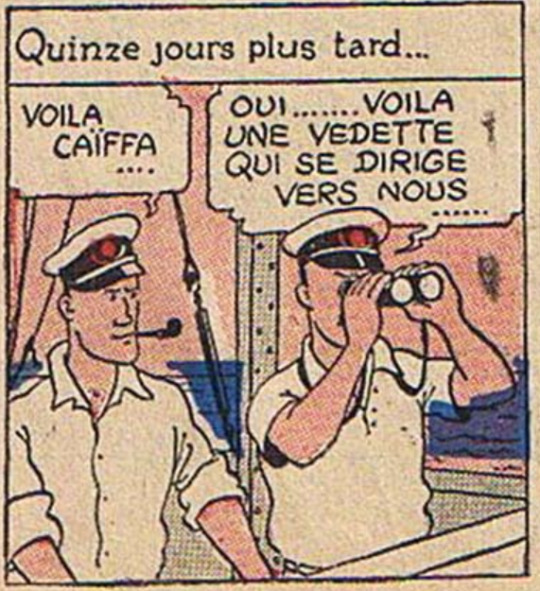
p. 14 (album: p. 7), p. 27 (album: p. 14): The original destination of the Speedol Star is Caïffa (Haifa), a real city in Palestine, instead of the fictional Khemkhâh (Khemikhal in English), Khemed.
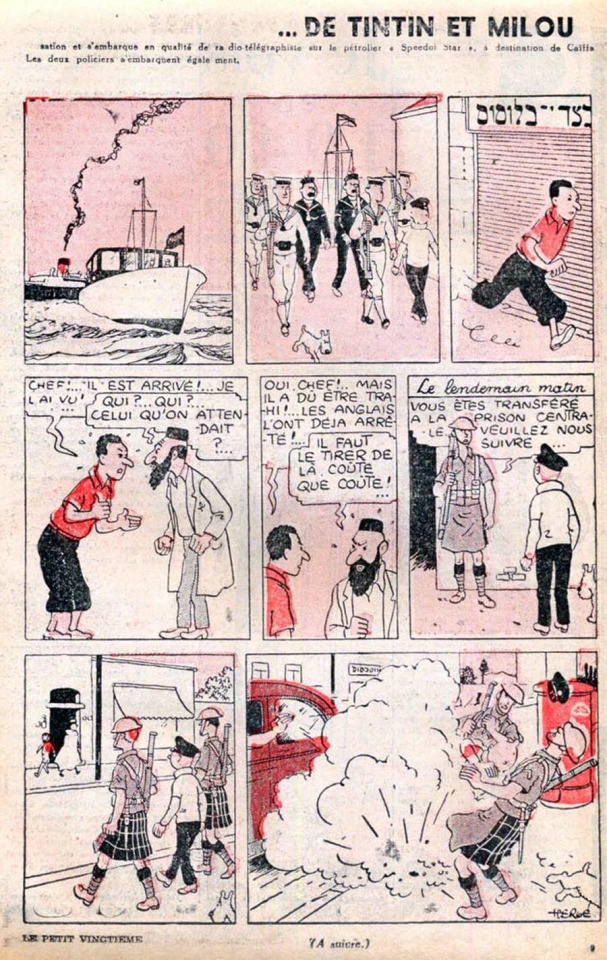

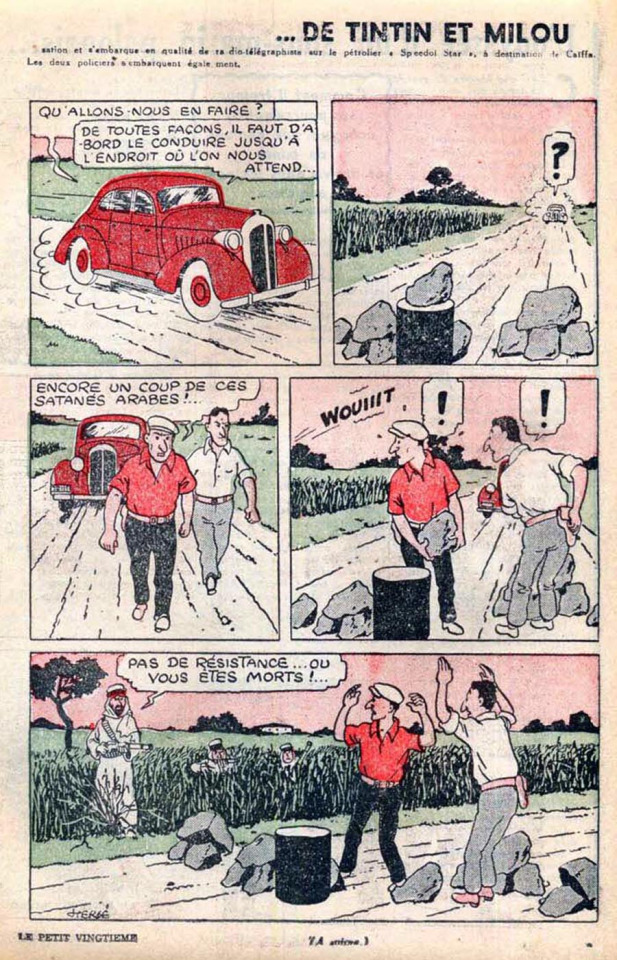

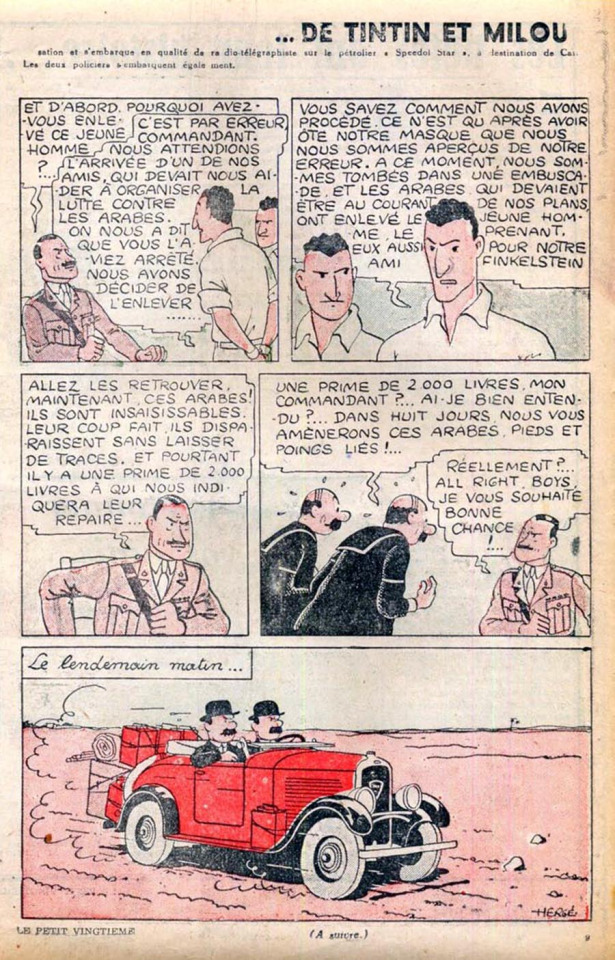
p. 30-34 (p. 15-17): Tintin's kidnapping progresses rather differently than in the 1971 album version. Arrested by the British police as a drug-smuggler, members of the Zionist faction mistake him for one of their agents (the only other man in the world with that haircut) and attempt to seize him back, but quickly realize their mistake. They are stopped by a roadblock and held up by members of the Arab faction, who also mistake Tintin for the same agent and capture only him. The original attackers are then arrested by the British and interrogated. The Thompsons, tempted by the £2000 reward, set out to search for Tintin's new captors.
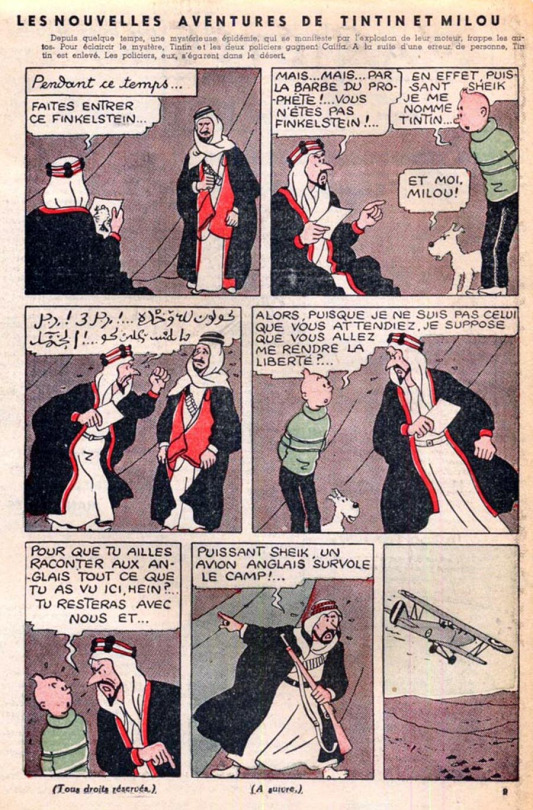
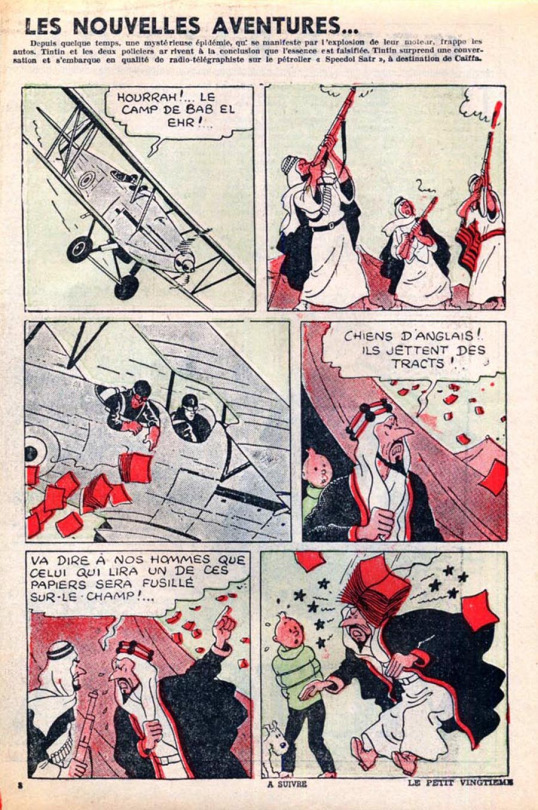
p. 37-38 (p. 17-18): Tintin is taken to Sheik Bab El Ehr, who also realizes he has the wrong man, but refuses to let Tintin go for fear that he'll betray their position to the British. A British biplane buzzes the camp and drops leaflets.
The joke about Bab El Ehr's men not knowing how to read is only in the 1971 album; originally he takes the leaflets seriously, threatening to have any man who reads one shot. On the next page, Tintin surreptitiously takes a leaflet from a stack while the Sheik's back is turned, a detail present in all serial versions but never followed up on in any of them; it's unclear what Hergé was planning to do with it, if anything.

Starting on p. 40 and continuing until the end of publication, the recap of the story in the header mentions that "Tintin and the detectives travel to Palestine." Earlier pages, starting p. 16, repeat that the destination of the Speedol Star is Caïffa.
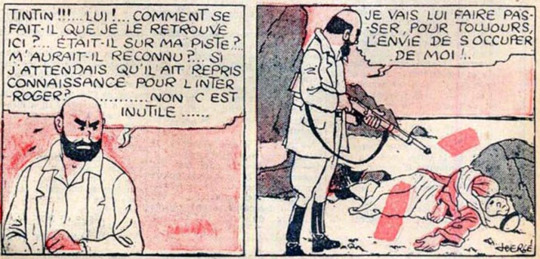
p. 56 (p. 27): Dr. Müller, aided by Arab rebels, blows up a pipeline. Tintin witnesses it, but is caught and apparently about to be killed... and then the story abruptly ends. On May 10, 1940, the Nazis enter Belgium, and Le Vingtième Siècle is shut down by the German occupier along with the rest of the Belgian press. Hergé reappears four months later in the occupier-run Le Soir with a new story, The Crab with the Golden Claws, dropping his politically sensitive subject and German villain.
Second serial version in Coeurs Vaillants, June 9, 1940-Dec. 29, 1940, and La Voix de l'Ouest, June 1, 1945-May 5, 1946 (incomplete)
Coeurs Vaillants, another right-wing Catholic children's magazine, began the French serialization of the Petit Vingtième's Land of Black Gold exactly a month after the last issue of the PV appeared and less than a week before the Nazis entered Paris. Originally based in the capital, the magazine moved its operations to Lyon, in unoccupied Vichy France, and continued to publish the story until the end of the year, cutting it short slightly before the first version does. With that context, the main interest of this version lies mainly in the crude censorship imposed on it.
It was also Coeurs Vaillants that coined the album's eventual title - the story had been serialized in the PV under the generic title of "Les nouvelles aventures de Tintin et Milou," as were The Black Island and The Broken Ear.
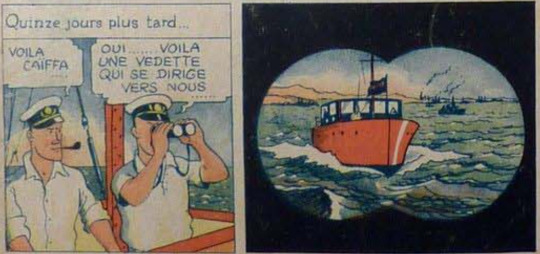
Issue no. 42: The Speedol Star arrives at Haifa once again.
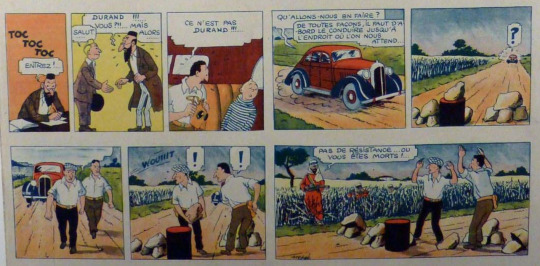
no. 44: The Jewish name "Finkelstein" is changed to the French name "Durand." The remark about "ces satanés Arabes" ("those blasted Arabs") is completely erased and its balloon converted into a cloud(?). All edits are clearly done by the magazine after receiving the plates.
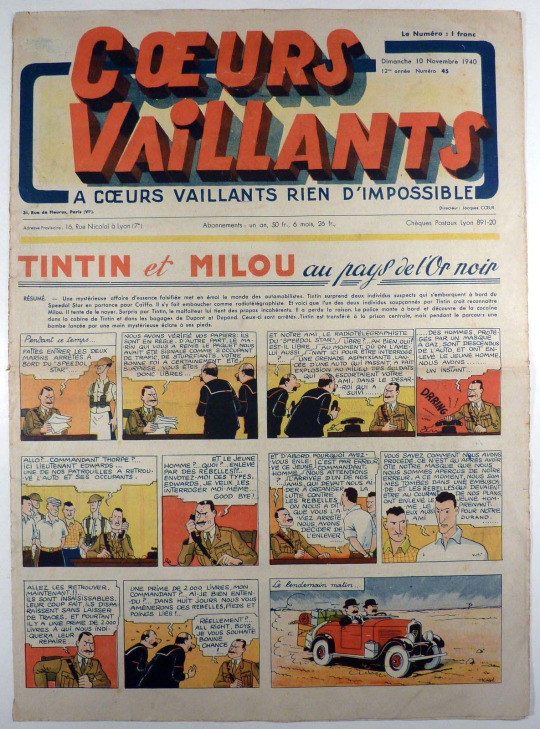
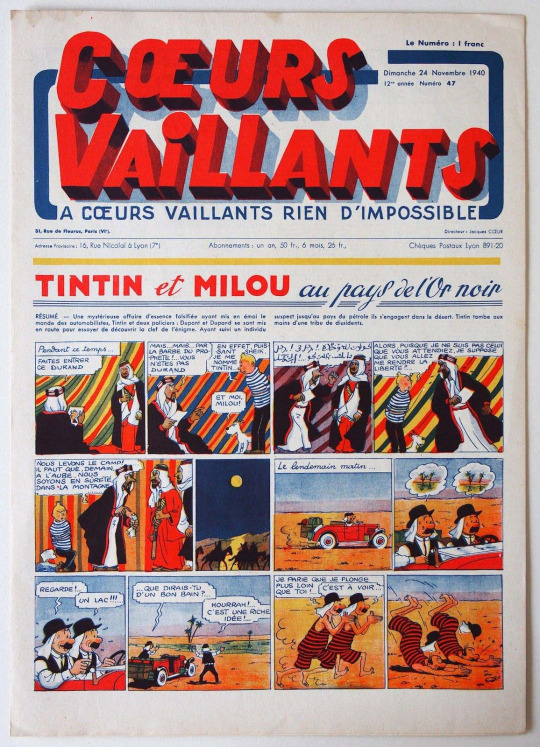
no. 45: Every instance of the word "juif" ("Jew") is erased, leaving blank spaces in the balloons; every instance of the word "arabe" ("Arab") is replaced with "rebelle" ("rebel"). If it's an attempt to obscure the setting of the story, it's a very clumsy one; Hergé's drawings are so clearly stereotyped that any reader of 1940 would surely be able to fill in the missing words themselves.
no. 47: The eleven panels comprising the incident with the British plane are deleted altogether. Tintin is ignored when he asks if he can leave. Tintin again takes a leaflet, but now they seem to have appeared out of nowhere. Most likely the magazine, which loudly and frequently proclaimed its admiration for Pétain during its Vichy residency, was wary of portraying the British Army in any way that could be construed as positive - or even of portraying the British Army at all. However, the police in the beginning are still clearly British, right down to their "Good Bye"s and "All Right"s.
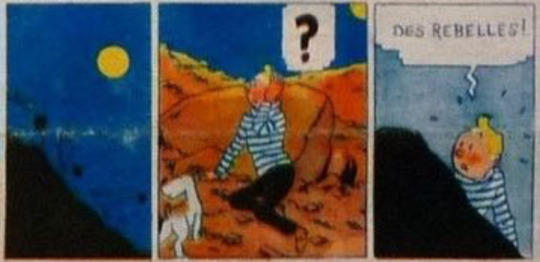
no. 52: Another instance of "arabes" changed to "rebelles." At six pages short of where the Vingtième publication stopped, this is the last page published in Coeurs Vaillants. In 1945, following the Liberation, it began publishing the story again from the beginning, but the magazine was quickly shut down by the government for having existed during the Occupation. The publication of Black Gold was then moved to a similar, smaller paper, La Voix de l'Ouest, but only made it as far as the Thompsons setting off into the desert to look for Tintin. Despite being published after the Liberation, it keeps all of the dialogue edits from Coeurs Vaillants.
Third serial version in the Journal Tintin, Sept. 16, 1948-Feb. 23, 1950, and first album version, 1950
Eight years later, having just finished the extensive serialization of Le Temple du Soleil but not yet ready to begin the research-heavy Moon books, Hergé decides to redraw and complete the story, naming it simply L'or noir (Black Gold). Swiss magazine L'Echo Illustré also runs this version, with no apparent changes, from 1949-1950. Fighting had broken out afresh between Palestinians and Zionist settlers following the UN Partition Plan proposing the creation of the state of Israel at the end of 1947 and was still in full swing when the story restarted. The British had withdrawn in May 1948 (on the same day as the declaration of the state of Israel) but are still present in the story, setting it slightly behind the times.
The 1948 serial was compiled into an album with a few minor changes and new colors in 1950; curiously, the album is actually more specific than the serial in its references to the conflict in Palestine. This is also the version that the 1963 RTF radio adaptation of Black Gold is based on.
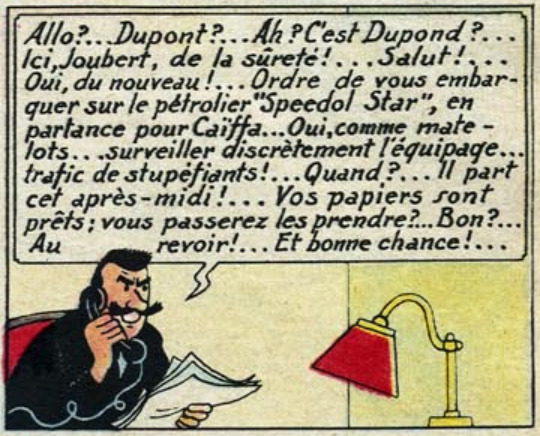
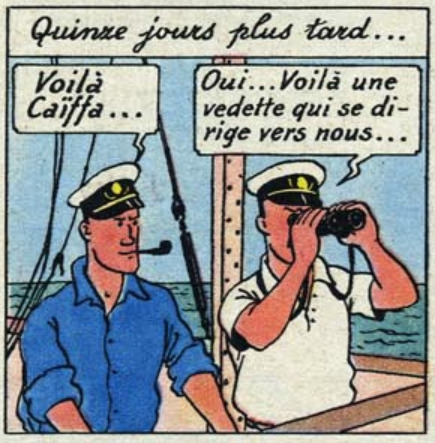
p. 7, p. 14 (1948): The Speedol Star's destination is still Caïffa. Neither the word "Palestine" nor "Israel" is mentioned, either in the strip itself or in the weekly recap in the header, for the whole story.


p. 7, p. 14 (1950): Same destination, but the spelling is finally corrected to "Haïfa" in the 1950 version. The Thompsons are now looking for spies aboard the Speedol Star instead of drug-smugglers. The sailor with binoculars also now specifies that the patrol boat coming to meet them is from "la Navy." Earlier versions had the sailor express surprise at the police coming aboard; in the album he concludes, very logically, that surveillance has been upped because of the tense international situation, though he doesn't mention the internal conflict in the country. The 1971 version keeps that line.
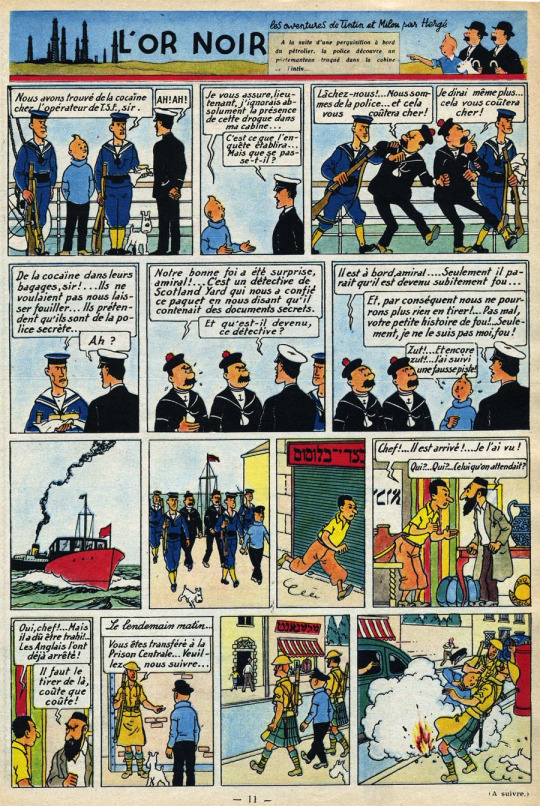
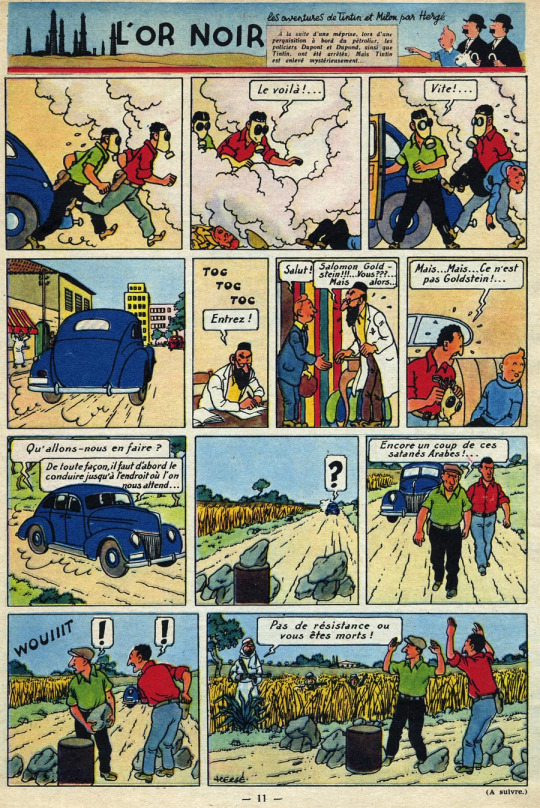
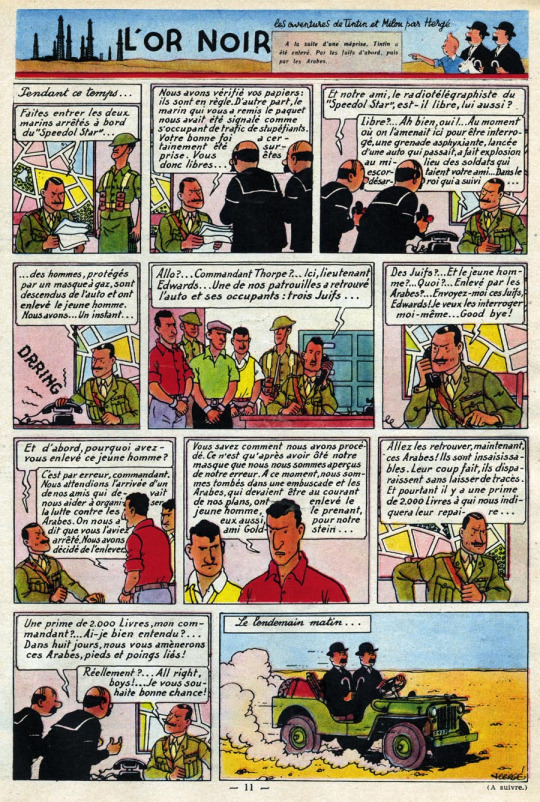
p. 15-17: Tintin's kidnappings play out the same way as in the first version, except that the Zionist agent's name has been changed from "Finkelstein" to "Salomon Goldstein." According to Philippe Goddin, the agent originally got his name from a certain René Finkelstein who worked at Coeurs Vaillants. Goddin doesn't speculate on why it was changed; however, at the end of the 1940s Hergé was having issues with Coeurs Vaillants, as the French edition of the Journal Tintin (launched 1948) was to become the only publisher of Tintin in France, depriving CV of one of its major draws. It's not impossible, though there's no real proof, that Hergé's retraction of Finkelstein was just a petty blow in that struggle.
In the 1950 album, what Tintin and the Thompsons are framed for changes from drug-smuggling to espionage: instead of cocaine, there are unspecified "documents" in their luggage. It's not clear who the original owners of the documents were spying for. The 1971 album splits the difference, with the detectives again caught with cocaine but Tintin with documents.

p. 17: The 1950 album is the first and only version to explicitly name Tintin's first kidnappers as members of the Irgun, a Zionist terrorist group that targeted both the British occupier and Palestinian Arabs between 1931 and 1948 and was later absorbed into the then newly-formed IDF.
It is notable that the depiction of the conflict remains exactly the same as in earlier versions, despite the vast changes in the international situation between 1939 and 1948. At the same time, the broad lines of the conflict in Palestine had changed little since before the war. Is the story still meant to be set in its original pre-war context? None of the announcements preceding its re-release in the Journal mention that it's a recycled story, and many of its readers would have been too young to remember its first run - many, but not all, as a few letter responses show. The cars and planes are updated, but when Bob de Moor was sent out to find references for the 1971 redraw, he specifically chose a tanker from 1939 for the Speedol Star. Also, the nonspecific threats of world war that characterize the first ten pages of the album remain even in the 1971 album, though their immediate link to reality had disappeared by 1948.
The 1948 recontextualization also somewhat obscures the role of Müller, which was very straightforward in the original version: he's a German agent trying to cut off his enemy Britain's access to oil while also undermining its colonial rule of the region - Britain and Germany had already declared war on each other when the first version began publication. It was consistent with the character, as well; a goal of Müller's in The Black Island (1937-1938) was to destabilize the British economy with his counterfeit money.
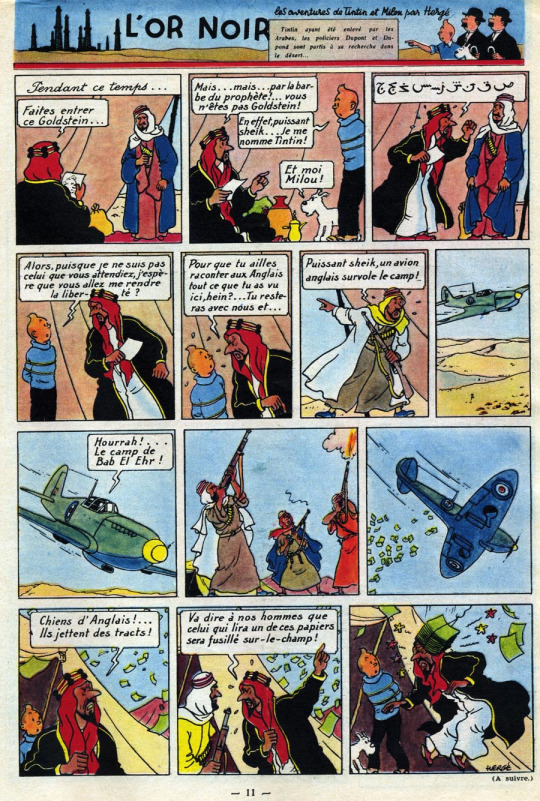
p. 19: The only change is that the British biplane has been upgraded to a British Spitfire. In the 1971 album, it remains recognizably a Spitfire but carries Khemedian livery. Bab El Ehr's enemy is still "les Anglais."
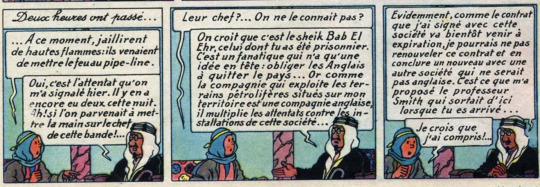


p. 36-38: Having passed the point where the first publication had stopped, the original context begins to disappear. The Zionist presence is entirely gone, making way for the intra-Arab power struggle that is the sole focus of the final album. However, in this case, the struggle between Bab El Ehr and Ben Kalish Ezab is not a proxy war between two competing oil companies but over the continued British presence in this ambiguous nation (see below), with the Emir allowing a British company access to his oil while the Sheik, "a fanatic," only wants to "force the English to leave the country." Predictably, given the publication context, the reader is intended to side with the pro-English forces, though no actual sign of a British - or even non-Arab - presence will appear from here on.
To return to the question of Müller: here, under the assumed English-sounding name of Professor Smith, he is representing non-British oil companies in the region while secretly directing sabotage on oil infrastructure, both by encouraging the destruction of pipelines and by using his "Formula Fourteen" to render oil stores useless. Once again, his motivations are much clearer as a German agent in a pre-war context; the 1948 version has him simply be the tool of that classic early Cold War BD villain, a carefully unspecified "grande puissance étrangère" ("great foreign power").
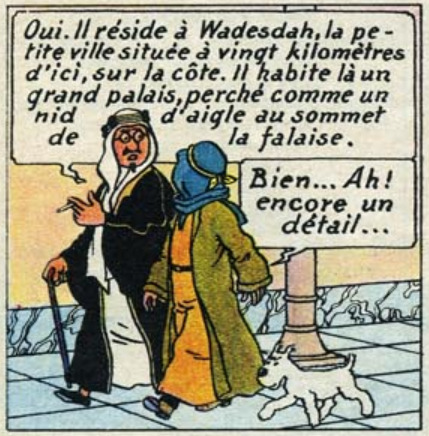

p. 41: The Emir sends Tintin to the fictional city of Wadesdah, "on the coast." Where are we? The Emir's kingdom won't be named until the 1971 album. Palestine fades into a generalized Middle East during the crossing of the desert, the two held together only by Bab El Ehr's struggle against the British in both territories. While the 1971 redraw was the ultimate erasure of the story's original context, it's clear that Hergé had already put it to the side as early as 1948.
As the story transitioned from a specific to a fictional context while attempting to maintain a coherent plot, it was forced to contort and contradict itself; it's not really surprising, then, that Hergé told Numa Sadoul he found the 1971 revised storyline "much simpler, therefore better." Sadoul lightly challenges him on it, however, bringing up Blue Lotus as an example of a technically outdated album that Hergé never considered de-politicizing. It seems to me the difference is that while the real-life political resonance of Blue Lotus is essential to its story all the way through, the only completed version of Black Gold abandons its link to reality around the halfway mark, making the redraw possible and, from Hergé's point of view, even desirable. It also betrays the short-sighted attitude of both Hergé then and Methuen later that partition and the declaration of Israel had simply settled the question of Palestine for good, an attitude that was mistaken then and is mistaken now.
53 notes
·
View notes
Text
About Me/FAQs
You can call me Avital. I am a non-binary traditional egalitarian Jew living in the US. Any pronouns except they/them are fine. (!היא/את בעברית, בבקשה. תודה)
I really appreciate human interaction. That being the case, if you follow me and I don't already follow you, please send me a DM with the following:
What you want me to call you (internet name, username, nickname, whatever)
What brought you here and made you want to follow me
Something random about you that you feel comfortable sharing (pet pics are always welcome too <3)
I had a whole lot of other rules on my previous blog to weed out the faint of heart, but I genuinely don't know how well that worked, so instead I will simply put roughly the same information below as resources and recommended reading. Fair warning: I will operate from a baseline assumption that you've done the reading and therefore will not be explaining anything in them.
I also had a listing of my firm opinions and other miscellaneous information. That got long and unwieldy, but a lot of people seemed to appreciate it, so I will post roughly the same list under the cut.
The current username refers to my current symbol of a tree of lanterns in the starlight. This is related to my desire to create self-symbolism, old school style (like I really want to create a family crest, a flag, a seal, and other heraldic nonsense. Why? Because it delights me, of course.)
This page is under construction and subject to change at any time.
B'vracha,
Avital
Recommend Reading
For followers who are Christian, were Christian, are non-Jews who grew up in a Christian culture and/or have only learned about Judaism through Christianity, these links are very helpful in unpacking some of the antisemitism you were taught:
Better Parables (specifically the article about Pharisees, but read the rest of the site too, it's great)
Antisemitic readings of the Temple table-flipping incident in the New Testament
The current Israel-Hamas war and just המצב discourse in general require a lot of background knowledge to discuss intelligently, and not just propaganda. There is a LOT of antisemitism in the public around this topic and it is having serious real-world consequences for Jews all over the world. The mis- and disinformation is causing problems for everyone involved. Islamophobia in the West has increased as well. If you're going to engage in this discussion, I am respectfully but forcefully asking you to read the following sources. They are useful regardless of where you fall on that political scale.
There Is No Magic Peace Fairy
Ways to help: [1], [2], [3]
Muslim organizations advocating for peace, education, positive interfaith relations, and fighting antisemitism
This is perhaps my best summary of my own feelings on the whole thing
Is your pro-Palestine activism hurting innocent people? Here's how to avoid that
Please learn what Kahanism is, because it actually is what people think Zionism is. Zionism is simply a desire for Jewish self-determination in our ancestral homeland of eretz Yisrael. Kahanism is a type of racism that cloaks itself in Zionism but is fundamentally bigoted.
A non-exhaustive list of antisemitic incidents, attacks, and pogroms during [OP's] lifetime
An exceptionally long and thorough explanation of antisemitism and antisemitic violence throughout history
Why The Most Educated People in America Fall for Antisemitic Lies by Dara Horn (tumblr link in case the article link gets broken)
This explanation of the atrocities endured by Soviet Jews and how the legacy of Soviet antisemitism undergirds western "antizionism-not-antisemitism." If you call yourself an anti-Zionist, this is required reading.
An excellent overview of the basics
This is nowhere near complete information, but it's an important start. I will very likely continue to add resources as they become available and would love to create a primer on this topic more generally.
If you don't believe that October 7th happened or wasn't that bad, or really any atrocity denial please read this article from a reporter who was shown the actual footage, as well as this article documenting its effects on him.
If you are still in denial about the pattern of gender based violence, sexualized torture, and widespread rape as a war tactic committed by Hamas on 10/7, you are legally required to read this article.
About the blog:
I’m going to try my best to keep this blog to primarily Judaism, comparative religion and theology, with the occasional side sprinkling of queer & trans stuff, BUT it is absolutely a personal blog at the end of the day.
I talked about Israel and המצב stuff a lot on my previous blog and will likely continue a bit over here too. I welcome a broad swath of opinions, so long as they objectively treat all parties involved as human and deserving of safety, stability, freedom, dignity, and peace. That is apparently a large ask these days, and a not-small part of why I keep talking about this issue. Please be part of the voices that give me hope for the future, okay?
Minors can follow and interact but please keep in mind that I’m probably closer to your parents' age than yours if you do want to interact with me directly.
Interactions:
Rude asks will be deleted. Harassing blogs will be blocked and probably reported.
I consider anything even remotely in the vicinity of trying to proselytize to me to be “harassing,” or at a minimum, rude. Just FYI.
Otherwise, nice interactions are welcomed.
Banter is encouraged; trolling will be ignored
If you are a goy and want to argue with me about Jewish theology, you have to match my perfect score on this popquiz, no cheating by looking things up during the quiz. I learned Judaism as an adult mostly through self-study so you have no excuse. If you're invested enough to argue with me you're invested enough to do the reading homework. (To clarify: I'm happy to explain Jewish stuff to anyone who is sincerely asking or just have a friendly comparative theology discussion or whatever. But I have zero patience for those who want to argue with me about basic shit claiming they know more than me, especially if what they're claiming they "know" is not only wrong but antisemitic and wrong.)
If I don't respond to your interaction, there's a strong chance that I (a) have no idea what to say and am thinking about it, (2) totally meant to respond and just forgot after the notif disappeared, and/or (3) got incredibly busy. It's not personal! Please don't be shy about following up with me if you like. I promise that if we have a problem that is fixable, you'll know. If we have a problem that is not fixable, you'll be blocked.
I am currently learning Ivrit and am delighted to have interactions in Hebrew. Please feel free to message me, reply to posts or reblog, submit asks, etc. in Hebrew and I will do my best to read and respond to it. (Responses will be slower, but not for lack of appreciation of your thoughts!)
Anything else, just ask.
Hard stances:
You're not going to change my mind on these things; I've looked at the evidence, my personal experiences, and thought about them long and hard, and I am not going to be swayed by an internet rando. I can (often, but not always) co-exist just fine with people who I disagree with, but if seeing my posts about this is going to upset you, just do us both a favor and block me now please.
I am deeply distressed at how many people are choosing to live in a "post-factual society" where the truth is based on truthiness vibes and the politics are based on the quippiest of slogans. I don't care who's doing it, misinfo, disinfo, propaganda, atrocity denial, and gaslighting are BAD. There is no nuance here; these are bad things. They are bad if they go against your cause and they are bad if they "support" your cause. No cause is better than the truth.
If we cannot have a discussion where we are operating from the same baseline reality of verifiable facts, we cannot have a productive conversation and I will not engage with you. We can agree or disagree on a lot and that is fine, but facts matter.
If you cannot be reasoned with in accepting verifiable facts as reality, you need help. I'm serious. That is cult behavior. Get off tumblr and get help.
I don't know how to tell you that you should care about other people. If you don't see the inherent worth in other human beings' lives, I can't fix that. Go take that struggle to G-d and heal your soul.
I support the right of the Jewish people to self-determination in our ancestral homeland of Israel, the same way that I support other indigenous groups' right to self-determination in their ancestral homelands. If you don't, I'm going to need you to examine why Jews should be singled out of every other group to be denied this right or denied support in seeking it. That said, I definitely do not agree with many of the decisions made by the Israeli government, especially (but far from exclusively) regarding their treatment of Palestinians. I think both Jews and Palestinians deserve to live in peace, safety, freedom, dignity, and self-determination for both. No one is going anywhere; any real solution must recognize that. I tend to favor this proposal by A Land for All as an ideal (and given the grassroots nature of this idea, I think it could work pragmatically too, if the political will exists on both sides.)
I reject the Zionist/anti-Zionist dichotomy altogether for a number of reasons: 1) It impedes conversation because too many people agree but will never know it because they refuse to talk about what they actually mean by those labels and instead make assumptions about the other group. 2) It inherently puts the validity of an existing state up for debate rather than looking at real solutions for the future. You cannot unmake the state of Israel without widespread atrocities, but you can figure out options for everyone to live together in peace and heal from the collective trauma. 3) It also makes it way too easy to play Good Jew/Bad Jew and "Zionist" has basically become the slur de jour for "Jew." It sucks that people took a Jewish word for an important Jewish concept and made it synonymous with "bloodthirsty racist," but personally I don't think arguing over that at this exact juncture in time is helpful.
Bottom line: I'm a humanitarian and a pragmatist, and I care about all the people who call that part of the world home.
Update: for real, if you have trouble seeing Israelis and Palestinians both as human and deserving of safety, dignity, freedom, and inherent worth as living human beings, I don't want to know you. I don't want to talk to you. Go fix yourself.
🌻 I stand with Ukraine 🇺🇦
Free Iran from the Islamic Republic // Women Life Freedom
Abortion is a human right and should be safe, legal, available on demand, and shameless. It's a necessary medical procedure and it's completely barbaric that we're still talking about it as anything else.
Birth control, abortion, and no-fault divorce are actively positive parts of society and building healthy families.
Transition care is healthcare and also a human right. Allowing people to transition prevents self-harm and suicide, and has an extremely high efficacy rate with an exceptionally low level of risk or regret. We now have well over a century of data on this.
That said, detransitioners who are still supportive of trans people/aren't transphobic are more than welcome here, as any exploratory process deserves the right to say, "Interesting! But nope!"
Transunity, ace/aro positivity, and just inclusionism in general, 100%. Fuck off with anything else.
Queer might be a slur in the mouths of some people, but my identity isn't. Don't reblog my posts if you're going to tag it with "q slur" or "q word" or censored in some way. I'm not Gay as in "I prioritize cis men over the entire rest of the community" but Queer as in "my personal labels are none of your business but my political stance on queer liberation sure as fuck will be."
If you don't vaccinate yourself and your kids for any reason other than medical necessity, and especially if you promote anti-vaxxer views and the associated pseudoscience, you are actively harming the most vulnerable members of society for entirely selfish reasons and that makes you a bad person. I hope your kids bypass you to get vaccinated.
Wear a mask 😷
187 notes
·
View notes